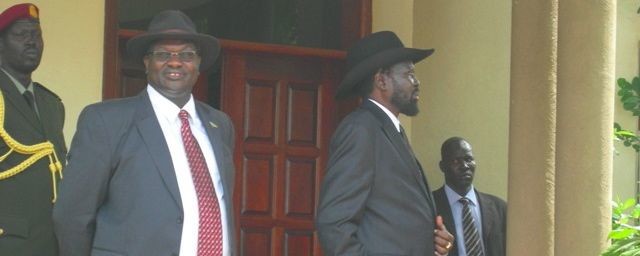South Sudan peace talks set to resume today

Negotiators representing different SPLM factions have arrived in the Ethiopian capital Addis Ababa to resume talks on ending the civil war in South Sudan and forming a transitional government.
The meeting comes just days ahead of the deadline set by the leaders of the warring SPLM-IO and SPLM-Juba factions to agree on terms for the formation of a transitional government.
SPLM-Juba leader Salva Kiir and SPLM-IO leader Riek Machar agreed at a 10 June summit of East African leaders that they would “expedite and complete dialogue on the formation of a transitional government of national unity within sixty days.”
The spokesman for Kiir’s delegation, Michael Makuei Lueth, told reporters in Juba on Sunday, “The delegation is leaving today for Addis. We are going to continue negotiations with the rebels and all the stakeholders on the peace talks.”
Lueth added, “The objective of this meeting is to continue negotiation so that we come back with peace to South Sudan. His Excellency the President had directed the government delegation to go to Addis and come back with peace.”
He said the delegation members are “optimistic” about returning to South Sudan with a peace deal.
“However, coming back with peace is also dependent on the commitment of the rebels,” he cautioned. “If you remember last time the talks had to be called off by the IGAD because the rebels boycotted the talks. Reasons being that they did not want to sit with the stakeholders but only to sit with the government delegation.”
He was referring to the SPLM-IO boycott of the last round of talks in late June, after a disagreement about the makeup of civil society delegations to the talks.
The SPLM-IO also disagreed with the “multi-stakeholder roundtable” format of the talks, in which the SPLM-Leaders and other third parties were regarded as equal stakeholders. They preferred instead to negotiate with the other armed faction only.
Owing to the boycott, the IGAD mediators on 23 June adjourned the talks indefinitely for ‘consultations,’ later announcing they would resume on 30 July.
However, the Juba delegation declined to come on that date because a national holiday had been declared from 28-30 July, closing banks.
The government delegation was therefore delayed in arriving at the talks because they did not have enough dollars to travel to Ethiopia, as reported elsewhere also.
Commenting on this, a minister in the delegation told Sudan Tribune, “The cause of this delay is not clear even to some of us in the government.”
The official, who was not identified by name, acknowledged that the delay “may be” caused by the “lack of foreign exchange,” while questioning whether this was a good reason for delaying, given that “the president had already asked the team to leave.”
SPLM-DC and SPLM-Leaders
According to Lueth, the mediators have not yet clarified to the Juba delegation whether the talks will take the format of a “multi-stakeholder dialogue” or otherwise.
This is considered significant because the SPLM-IO group had earlier rejected to include the SPLM-Leaders group – also referred to as the ‘Former Detainees’ – and other delegations as equal ‘stakeholders,’ instead accepting them only as observers.
“IGAD has not even clarified to us as to whether the rebels have changed their mind and … whether we are going now to sit with all the stakeholders in a multi-stakeholder dialogue, or we are going to sit with the rebels alone,” said the minister.
But a group of seven politicians from the Political Parties Leadership Forum (PPLF), representing smaller opposition parties including SPLM-DC, left Juba for Addis Ababa on Sunday.
Lam Akol, the chairman of SPLM-DC said upon departure, “This group is the delegation of the Political Parties of South Sudan [i.e., PPLF]. As you know that we are a stakeholder in the Addis Ababa peace talks.”
“We are going this time after more than one month break… We hope that this time all the stakeholders will be on the table so that we resolve this issue quickly. As you know every day that passes means more death, more destruction, more displacement, more hunger to our people,” he said.
The SPLM-DC politician noted this round of talks is different from previous talks because his delegation is now participating: “Before, there were only the two warring parties that were talking, and of course they have different approaches to the problem – we as political parties we are approaching the problem from the sole interest of our people.”
PPLF members’ involvement in the talks was disputed last week by South Sudan’s cabinet minister, Martin Elia Lomuro, who belongs to a party aligned with SPLM-Juba but nominally also belonging to PPLF.
The minister declared the PPLF representatives selected to participate in the peace talks were ‘illegal’ and ought not to travel to Addis Ababa. He had been accused by PPLF members of seeking to take over leadership of the group by ‘intimidation.’
File photo: President Salva Kiir and his then deputy Riek Machar during a visit by the Sudanese President Omar al Bashir to Juba